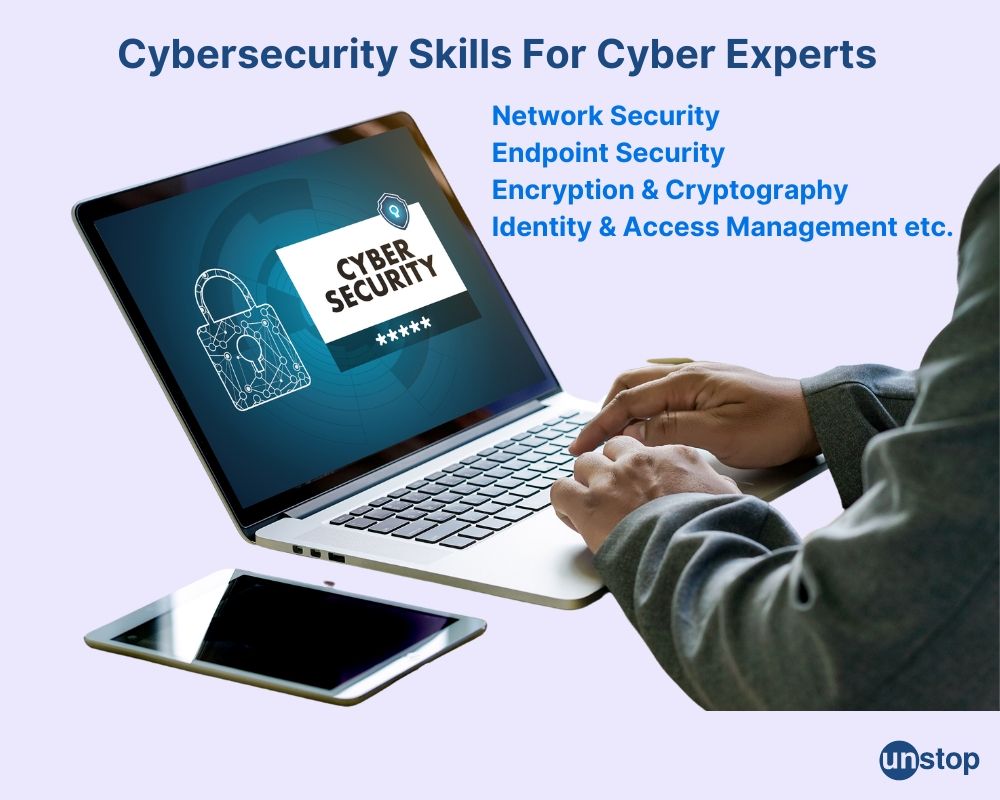- Meaning Of Cybersecurity Skills
- Top 16 Must-Have Cybersecurity Skills
- Risk Analysis As One Important Cybersecurity Skills
- Networking, System Management & Operating System
- Network Security Control Tactics
- Conclusion
- Frequently Asked Questions (FAQs)
Cybersecurity Skills- Top 16 Essential Skills You Need To Master

The need for cybersecurity experts is at an all-time high due to our growing dependence on technology. Whether you're a seasoned IT professional or someone looking to switch careers, developing cybersecurity skills can open up a world of opportunities.
Explore the increasing dangers in the cybersecurity landscape, discover the advantages of acquiring these abilities, and learn actionable ways to boost your expertise. Dive into the realm of defending against online threats and securing valuable data by delving deeper into this article!
Meaning Of Cybersecurity Skills
Cybersecurity skills refer to the technical knowledge, expertise, and abilities required to protect computer systems, networks, and data from cyber threats.
Top 16 Must-Have Cybersecurity Skills

To thrive in the ever-evolving cybersecurity landscape, professionals need a range of essential skills. Here are the top 16 must-have cybersecurity skills:
Network Security
This skill involves understanding how networks operate and the various security measures used to protect them. It includes knowledge of network protocols, such as TCP/IP, and technologies like firewalls, intrusion detection/prevention systems (IDS/IPS), and Virtual Private Networks (VPNs).
Network security professionals configure and manage these technologies to safeguard networks from unauthorized access, malware, and other cyber threats.
Endpoint Security
Endpoint security focuses on securing individual devices (endpoints) such as computers, smartphones, and tablets. Professionals in this area deploy and manage security solutions like antivirus software, host-based firewalls, and endpoint detection and response (EDR) systems.
They ensure that endpoints are protected against malware, data breaches, and unauthorized access, both within and outside the organization's network.
Vulnerability Assessment & Penetration Testing (VAPT)
VAPT involves identifying and evaluating vulnerabilities in systems and networks through penetration testing. Security professionals use tools and techniques to simulate cyberattacks and exploit weaknesses in security controls.
Organizations can strengthen their security by conducting VAPT assessments to detect and fix security vulnerabilities before cybercriminals exploit them. This proactive approach helps enhance overall security.
Incident Response & Forensics
Cybersecurity skills involve the actions taken to identify, respond to, and bounce back from cybersecurity attacks. Those working in this field create and implement plans to handle incidents, including detecting, containing, eliminating, and recovering from them.
The role of digital forensics is vital in responding to incidents by gathering, safeguarding, and scrutinizing digital proof to uncover the details and extent of security breaches.
Security Monitoring & Threat Intelligence
Security monitoring involves continuously monitoring networks, systems, and applications for security events and anomalies using security information and event management (SIEM) systems.
Security professionals analyze security alerts and leverage threat intelligence feeds to identify and mitigate emerging threats.
Encryption & Cryptography
Encryption involves converting regular data into a secret code known as ciphertext to safeguard it from unauthorized individuals. Cryptography encompasses the principles and techniques used to secure communication and data integrity.

Cybersecurity experts apply encryption algorithms, cryptographic protocols, and key management techniques to establish strong encryption systems that protect data, whether it is stored or transferred, guaranteeing privacy and security.
Identity & Access Management (IAM)
Managing user identities, authentication, and access controls is a crucial part of cybersecurity. It ensures that only the right people can access resources and data. Professionals in this field use IAM solutions to enforce security measures like least privilege, multi-factor authentication, and role-based access control.
Developing secure code, conducting routine code reviews, and implementing security testing are essential practices that assist companies in minimizing potential security vulnerabilities in their software.
Secure Coding Practices
Developing software applications with security in mind is known as secure coding. The goal is to prevent vulnerabilities that attackers could exploit. Security professionals follow secure coding principles like input validation, output encoding, and secure configuration.
Writing secure code, along with regular code reviews and security testing, helps organizations reduce the risk of security flaws in their software.
Compliance & Risk Management
Following the rules set by the General Data Protection Regulation (GDPR) or the Health Insurance Portability and Accountability Act (HIPAA), organizations reduce risks linked to cloud data storage. Adhering to industry standards and regulations is key to safeguarding data.
Cybersecurity skills involve managing risks by identifying, assessing, and reducing potential threats.
Cyber experts in this field ensure that organizations adhere to regulations and standards while effectively safeguarding data and ensuring business operations continue without disruption.
Security Awareness & Training
Educating users and employees about cybersecurity risks, policies, and best practices is essential through security awareness and training programs. Professionals in the security field create and distribute training materials, run campaigns to raise awareness and provide continuous education to foster a security-conscious environment within the organization.
Empowering individuals with the know-how to identify and address security risks can lower the chances of human mistakes leading to security breaches within companies.
Cloud Security
Cloud security focuses on securing cloud-based services, platforms, and infrastructure against cyber threats. Security professionals design and implement security controls and best practices for cloud environments.
This includes configuring access policies, encrypting data, and monitoring cloud environments for security incidents and vulnerabilities.
Mobile Security
Mobile security involves securing smartphones, tablets, and other mobile devices against cyber threats. Security professionals implement mobile device management (MDM) solutions, enforce security policies, and deploy mobile security controls such as device encryption, remote wipe, and app whitelisting/blacklisting.
By protecting mobile devices and applications, organizations can prevent data breaches, malware infections, and other mobile-related security incidents.
Web Application Security
Web application security focuses on securing web applications against common vulnerabilities and attacks, such as Structured Query Language( SQL ), injection, cross-site scripting (XSS), and cross-site request forgery (CSRF).
Security experts analyze web applications by performing security assessments, code reviews, and penetration testing to pinpoint and fix any vulnerabilities that may exist.
Artificial Intelligence (AI)
Specializing in cybersecurity with a focus on artificial intelligence can lead to a well-paying job. The field of AI is expanding quickly and is becoming essential in various industries by handling repetitive tasks and aiding in decision-making processes.
When applied to cybersecurity, AI can offer unparalleled abilities in identifying online threats and adapting without human involvement.
IoT Security
IoT security involves securing Internet of Things (IoT) devices and networks against cyber threats. Cybersecurity professionals assess and mitigate security risks associated with IoT devices, such as insecure firmware, weak authentication, and lack of encryption.
To safeguard IoT devices from cyber threats, it's crucial to set up security measures like dividing networks, verifying device identity, and regularly updating firmware.
Cybersecurity Governance & Strategy
Cybersecurity governance encompasses the policies, processes, and structures for managing and overseeing cybersecurity within an organization. Security professionals develop cybersecurity strategies, establish governance frameworks, and align cybersecurity initiatives with business objectives.
By implementing effective cybersecurity governance and strategic planning, organizations can prioritize investments, allocate resources, and manage cyber risks effectively to protect critical assets and support business goals.
Risk Analysis As One Important Cybersecurity Skills
Risk analysis plays a pivotal role in ensuring the effectiveness of cybersecurity measures. By conducting thorough risk assessments, organizations can identify vulnerabilities and prioritize mitigation efforts accordingly.
This proactive approach helps prevent costly security breaches and safeguards sensitive information from unauthorized access.
A comprehensive risk analysis involves evaluating the likelihood and potential impact of various threats, identifying vulnerabilities within systems and networks, assessing existing controls, and developing strategies to address gaps in security measures. Regular risk assessments enable organizations to adapt their cybersecurity strategies based on evolving threats and technological advancements.
Networking, System Management & Operating System
Let us study the basics of networking, system management, and operating systems in cybersecurity:
Networking Fundamentals
To excel in a cybersecurity career, it is essential to understand networking basics that involve learning about different network topologies, such as LAN (Local Area Network) and WAN (Wide Area Network), as well as understanding protocols like TCP/IP (Transmission Control Protocol/Internet Protocol).
It is important to know how data travels across networks, how devices communicate with each other, and how to troubleshoot network issues.
System Administration
Mastering system administration is a key cybersecurity skill alongside networking. System administrators handle tasks like setting up operating systems, overseeing user accounts, and safeguarding system security. Cybersecurity professionals can enhance their skills by becoming proficient in system administration.
This expertise enables them to grasp the setup and susceptibilities of computer systems, empowering them to pinpoint potential flaws and enforce suitable security measures against online threats.
Knowledge Of Operating Systems
To excel in the field of cyber security, it is crucial to have a strong understanding of various operating systems. Each operating system has its own unique features and vulnerabilities that hackers may exploit. By familiarizing yourself with these systems, you will be better equipped to identify potential security risks and develop effective countermeasures.
Network Security Control Tactics
To effectively implement network security control tactics, it is crucial to have a solid understanding of the working principles of routers, firewalls, and other network devices.
Router
Routers play a crucial role in directing network traffic between various networks by examining data packets and applying specific guidelines to ensure the secure and efficient flow of information.
Firewalls
Firewalls create a wall that blocks unauthorized traffic from entering internal networks by following specific security rules.
Intrusion Detection Systems (IDS)
In the realm of cybersecurity skills, it is crucial to utilize Intrusion Detection Systems (IDS) to maintain network security. These systems play a vital role in monitoring network traffic to pinpoint any suspicious behaviour or potential security breaches. By identifying abnormalities such as unusual patterns or known attack signatures, IDS aids in protecting against cyber threats.
Quickly spotting these events allows for the implementation of suitable actions to address and reduce any possible harm caused.
Virtual Private Networks (VPNs)
Virtual Private Networks (VPNs) provide an additional layer of network security by encrypting data transmitted over public networks. VPNs establish secure connections between remote users or sites, ensuring that sensitive information remains confidential and protected from unauthorized access.
Conduct Internal Security Audits
Cybersecurity professionals need the skill to perform internal security audits to spot system weaknesses. Regularly checking an organization's IT setup helps find vulnerabilities that hackers could exploit. Thorough security audits help fix weaknesses before they become a problem.
Conclusion
Having strong cybersecurity skills is essential in today's digital era. It is important to grasp concepts like networking, system management, operating systems, virtual machines, network security strategies, coding, cloud security, advanced cybersecurity methods, blockchain and IoT security, and the impact of AI on cybersecurity. These skills are valuable for protecting sensitive information and thwarting cyber threats.
Continuously expand your expertise by delving deeper into each of these aspects. Keep yourself informed about the latest trends and technologies in cybersecurity to be prepared for upcoming challenges. Remember, the field of cybersecurity is always changing, so ongoing learning is essential.
Frequently Asked Questions (FAQs)
1. What are the essential cybersecurity skills?
To excel in cybersecurity, essential skills include knowledge of networking and system management basics, understanding operating systems and virtual machines, proficiency in coding for cybersecurity, familiarity with network security control tactics, and expertise in cloud security, advanced cybersecurity concepts, blockchain and IoT security, as well as AI in cybersecurity enhancement.
2. How can networking and system management basics contribute to cybersecurity?
Networking and system management basics are crucial for cybersecurity professionals as they provide a foundation for understanding how networks operate. This knowledge helps in identifying vulnerabilities, implementing secure configurations, monitoring network traffic, and responding effectively to potential threats.
3. Why is coding important for cybersecurity?
Coding plays a vital role in cybersecurity as it enables professionals to develop secure applications, analyze code for vulnerabilities, automate security processes, and create custom tools for threat detection and response. Proficiency in coding languages like Python or C++ enhances a cybersecurity expert's effectiveness.
4. What is the significance of cloud security in cybersecurity?
Cloud security is paramount due to the increasing adoption of cloud computing. Cybersecurity professionals must understand how to secure data stored in the cloud, protect against unauthorized access or data breaches, implement strong authentication mechanisms, and ensure compliance with relevant regulations.
5. How does AI enhance cybersecurity?
AI improves cybersecurity through automating the detection and response to threats. By using machine learning algorithms, large volumes of data can be analyzed to spot patterns that suggest cyber attacks. Systems powered by AI can quickly adjust and learn from new threats, enhancing defence capabilities against advanced adversaries.
Suggested reads:
- Switching From Computer Science To Data Science? Here Are Some Skills To Focus On
- Generations Of Computer | 1st, 2nd, 3rd, 4th & 5th Generations
- Flow Control in Computer Networks & Its Techniques Simplified
- Difference Between Computer Architecture And Computer Organization
- Everything You Need To Know About The Top Cloud Computing Applications In The Real World
Instinctively, I fall for nature, music, humor, reading, writing, listening, traveling, observing, learning, unlearning, friendship, exercise, etc., all these from the cradle to the grave- that's ME! It's my irrefutable belief in the uniqueness of all. I'll vehemently defend your right to be your best while I expect the same from you!
Login to continue reading
And access exclusive content, personalized recommendations, and career-boosting opportunities.
Subscribe
to our newsletter














Comments
Add comment